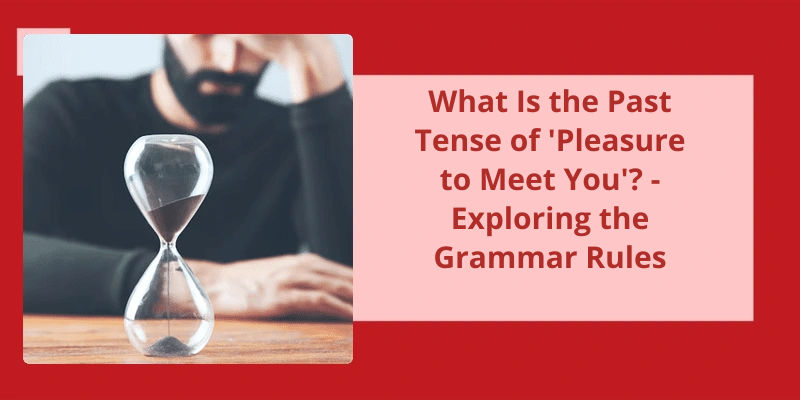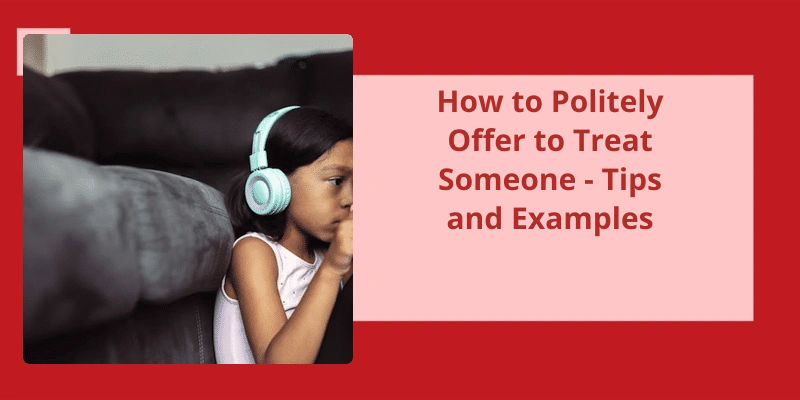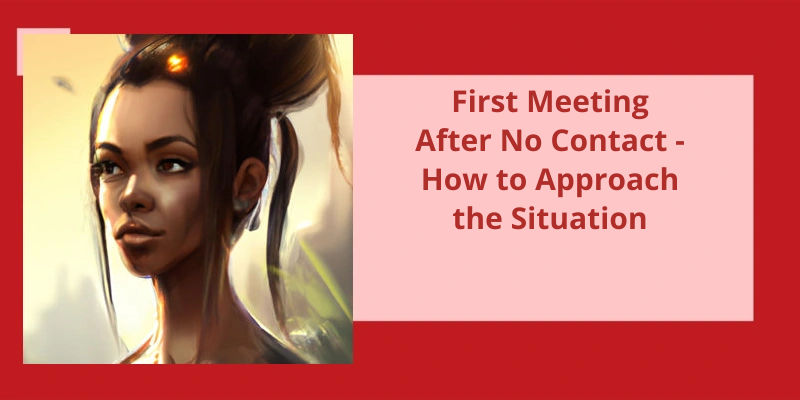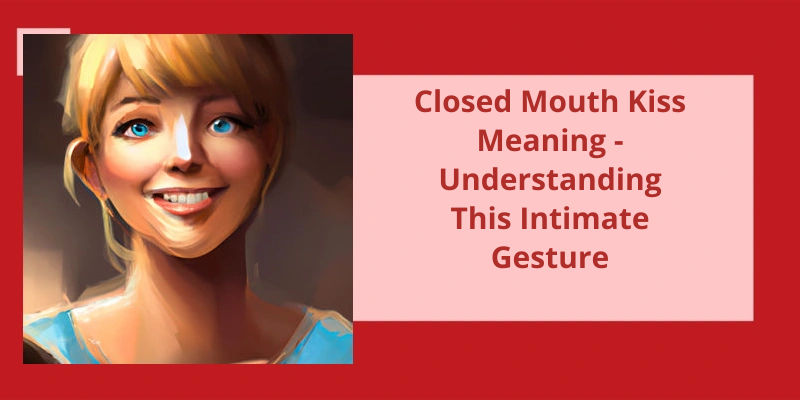Human beings are wired for connection. From the moment we're born, we seek out human interaction and build relationships through communication. One of the most common phrases we use when we first meet someone is "pleasure to meet you." This simple statement sets the tone for a positive interaction and lays the foundation for a potential friendship or business relationship. However, what happens when the interaction is over, and it's time to say goodbye? Many people struggle with finding the right words to express gratitude for the meeting and show appreciation for the other person's time. That's where the past tense of "pleasure to meet you" comes in – "It was a pleasure meeting you." This subtle shift in tense conveys a sense of finality and gratitude for the encounter while also leaving the door open for future interactions. So, if you're looking for a polite way to end a meeting or conversation, remember to use the past tense – "It was a pleasure meeting you, and I hope to see you again soon."
Is It Correct to Say It Was a Pleasure to Meet You?
The phrase itself is laden with well-wishes and is commonly used as a way to express gratitude. It’s often said with a smile and a handshake as a parting gesture. The phrase is widely accepted in the Western world as a sign of courtesy and good manners.
The phrase carries a sense of social etiquette with it and is commonly used as a formality in professional and personal settings. It serves as a way of showing appreciation for the time and effort that someone has put into meeting you, and also a way of expressing your own respect and admiration for the person.
While the phrase is often taken at face value, it can be argued that it’s true meaning lies in the intention behind it. When you utter these words, you’re essentially saying that you felt valued and respected in the interaction, and that it brought you pleasure to get to know the other person.
Therefore, the phrase can be seen as an expression of gratitude as well as a reflection of the quality of the interaction that took place between two people. It’s a way of saying that the meeting was enjoyable and that you found the other person to be engaging and pleasant.
Overall, saying “It was a pleasure meeting you” is a polite way of ending a conversation and expressing gratitude for the time and effort that’s been put into the interaction. It’s a reflection of the quality of the interaction as a whole and serves as a way to leave a positive impression on the other person.
When it comes to expressing gratitude after meeting someone, the phrase “It was a pleasure to meet/meeting you” is commonly used. However, some people may wonder if they should use “to meet” or “meeting”. The good news is that both options are correct, as they’ve the same meaning and usage.
Is It Great Pleasure to Meet You or Meeting You?
Meeting someone new can be a thrilling experience, and whether you say “it was a pleasure to meet you” or “it was a pleasure meeting you” may seem like a small detail, but it can actually have a big impact on the way you come across. However, the good news is that when it comes to these two phrases, there’s no real difference in meaning or usage. So, whichever one you choose to use, the sentiment will still be the same.
It’s important to remember that meeting someone for the first time can set the tone for future interactions. But at the end of the day, both of these phrases convey the same message: that you enjoyed spending time with this person and appreciated the opportunity to get to know them.
Other Ways to Phrase a Pleasant Interaction With Someone New, Such as “Nice to Meet You” or “Such a Pleasure to Make Your Acquaintance”
There are alternative ways to introduce yourself to a new person without using common phrases like “nice to meet you” or “a pleasure to make your acquaintance.”
Is Nice to Meet You Too Past Tense?
When you first meet someone, it’s important to make a good impression and show that you’re friendly and approachable. One of the ways to convey this is by saying It’s nice to meet you, which signals that you’re happy to have made their acquaintance. Using the present tense is appropriate in this situation, as it implies that you’re currently experiencing a pleasant feeling.
However, when the encounter comes to an end, it’s common to switch to the past tense and say It was nice to meet you. This acknowledges that the interaction is over and that it’s now a pleasant memory. It’s also a polite way of saying goodbye and expressing gratitude for the time spent together.
Of course, there are variations of this expression that can be used depending on the situation and the level of formality required. In more casual settings, you might simply say Nice meeting you or Great to meet you, without the verb to be. Conversely, in formal situations such as business meetings or interviews, it may be more appropriate to use the full version of the sentence, with the verb is or was included.
Overall, the way you greet and bid farewell to others can have a significant impact on the impression you make on them. By using the right tone and choosing your words carefully, you can leave a lasting positive impression and build meaningful relationships with others. So next time you meet someone new, remember to say nice to meet you or it was nice to meet you and leave your mark on the conversation.
When ending a conversation with someone, it’s common to express gratitude and respect. One way to do so is by saying “It was a pleasure talking to you.” But is it okay to use this phrase? Some people may wonder if it’s too formal or old-fashioned, while others might be concerned about using gendered language. In this article, we’ll explore whether saying “It was a pleasure” is still appropriate in modern communication.
Is It OK to Say It Was a Pleasure?
Saying “it was a pleasure” is one of the most common ways to end a conversation, especially when meeting someone for the first time. While some might find it cliche, it remains a polite and respectful way to express your appreciation towards the person you’re talking to. It conveys gratitude without sounding insincere or formal, making it an ideal way to leave a lasting impression.
Whether it’s a casual chat with a friend or a business meeting with a colleague, the phrase is versatile enough to convey an appropriate level of gratitude without appearing too casual or too formal. It’s a way to acknowledge the value of the other persons time and effort, while also expressing your own enjoyment in the interaction.
Even if the conversation itself might not have been entirely successful, saying this phrase can leave a lasting impression of goodwill. It suggests that the interaction was meaningful, regardless of the outcome, and can lead to future interactions with a more positive attitude.
Even if it’s become somewhat cliche, it remains a sincere and respectful way to end a conversation.
Appropriate Ways to Express Gratitude and Appreciation in Professional Settings
- Say thank you in person or via email
- Write a handwritten note
- Give a small gift or token of appreciation
- Publicly acknowledge their contribution during a meeting or presentation
- Offer to help them in any way possible in the future
- Send a personalized greeting card
- Recommend them to others in your network
- Treat them to lunch or coffee
- Offer positive feedback or a testimonial on social media or review sites
Conclusion
In conclusion, the correct past tense of "pleasure to meet you" is "it was a pleasure meeting you." While it may seem like a small detail in a conversation, using the appropriate tense shows a level of respect for the person you're speaking with and highlights your proficiency in the English language. It may seem like a simple gesture, but ending a conversation by expressing your appreciation for meeting someone and your hope to cross paths again in the future can leave a lasting impression and potentially lead to future opportunities. So next time you're bidding farewell to someone, remember to use the correct past tense and leave a positive impression behind.






